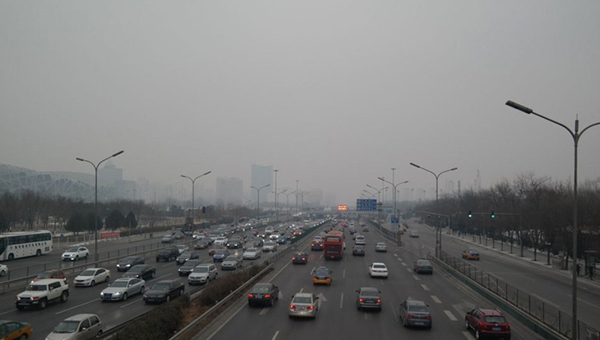Beijing gov't criticized for ongoing smog
Xinhua, February 17, 2014
Heavy smog in Beijing lasting for days has triggered public criticism over the municipal government's inaction.
At 8 p.m. Sunday, the air quality index (AQI) at monitoring stations in the city's downtown areas read between 342 and 414 and was rated at Level 6, the highest level, indicating hazardous pollution, according to the Beijing Municipal Environmental Monitoring Center's website.
 |
Heavy smog shrouds Beijing on Feb. 14.
|
The business channel of the China Central Television (CCTV) late on Saturday questioned why the government failed to initiate an emergency response under such smoggy weather.
"Beijing municipal government, don't pretend to be blind in the fog," the channel said via its account on the Twitter-like Weibo.com. "The government should not shun its responsibility or turn a blind eye to the smog."
The channel tweeted twice on the matter in five minutes, and the post had been forwarded by netizens thousands of times as of Sunday morning.
Beijing is not the only region facing the suffocating air on Sunday. The National Meteorological Center issued a yellow alert at 6 a.m. Sunday, forecasting medium to serious haze in Beijing and nearby Tianjin Municipality and the provinces of Hebei, Shandong, Henan, Shanxi, and Shaanxi. It said smog would last until late Sunday, when a fresh wave of rain and snow would hit most of the country.
QUESTIONS OVER GOV'T INACTION
The Beijing municipal government approved and put into effect an emergency response system last October. The system requires that traffic be cut with alternate driving days for even- and odd-numbered license plates and schools suspended if a red alert, the highest level for air pollution, is issued. Industrial plants will be closed or told to reduce production and fireworks will be banned if an orange alert, the second-highest alert, is issued.
However, the government has not initiated the emergency response once since the program came into effect on Oct. 22, 2013, although the public has on several occasions complained of smog heavy enough to warrant a government response.
The government issued a blue alert for air pollution late on Saturday.
The city has a four-tier alert system, using blue, yellow, orange and red to indicate the air pollution level in order of increasing severity.
A red alert indicates the most serious air pollution, or Level 6 pollution, for three consecutive days. An orange alert indicates heavy to serious air pollution, or Level 5 to Level 6, alternately for three consecutive days.
The latest round of smog started on Friday, which marked both the traditional Chinese Lantern Festival and Valentine's Day. Holiday fireworks brought the air quality index (AQI) from more than 300 in the morning to 500 in the evening.
Residents questioned the lack of government action over the matter, believing authorities should have banned fireworks.
Wang Yuesi, a researcher with the Institute of Atmospheric Physics of the Chinese Academy of Sciences, said orange and red alerts required action by the public, such as cutting traffic, and government authorities were reluctant to issue the response as smog for three consecutive days is difficult to forecast accurately.
"Environmental authorities lacked preparation in responding to smog for both technical reasons and management reasons. All they hope is that continuous smoggy days like this never come," Wang said.








0 Comment :
Post a Comment
Thanks for your comment!